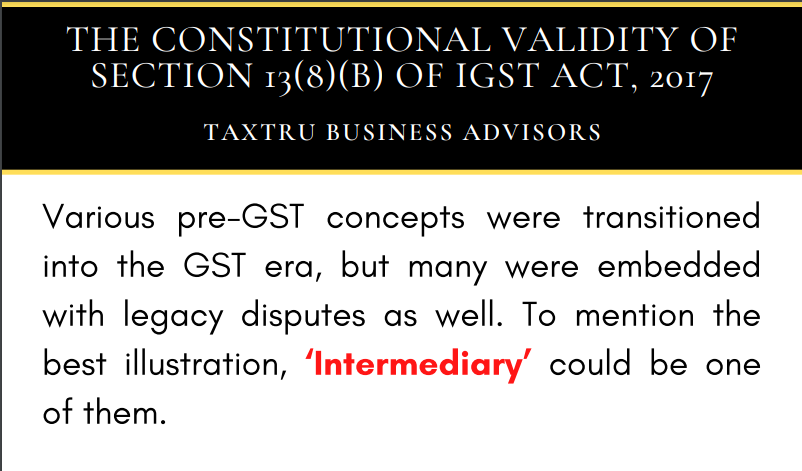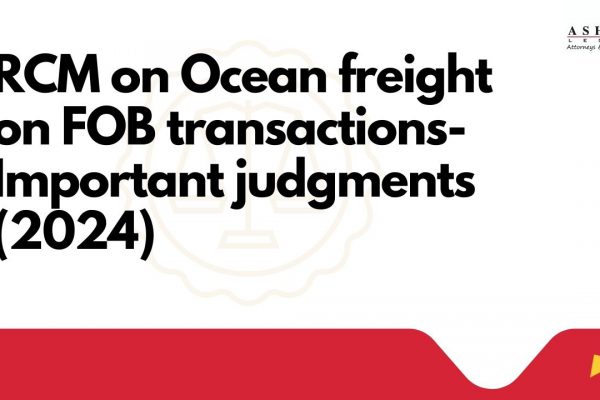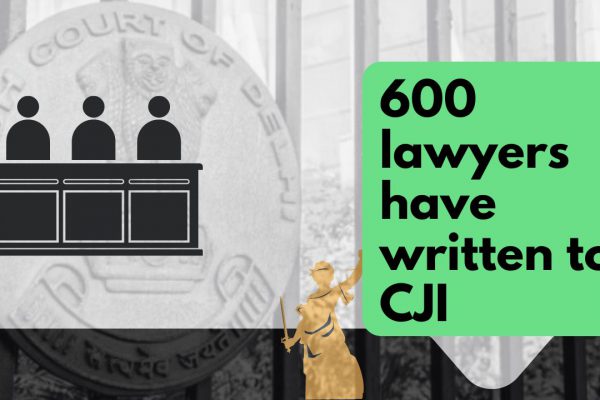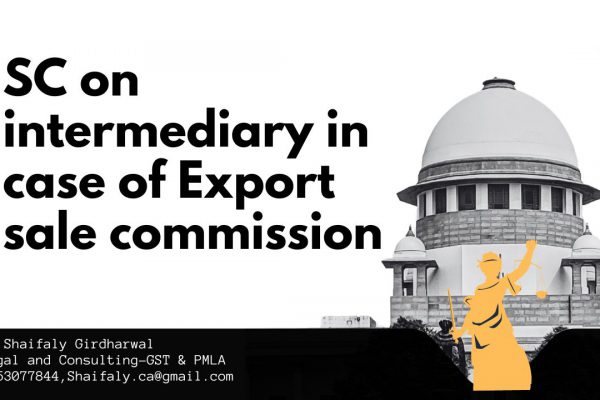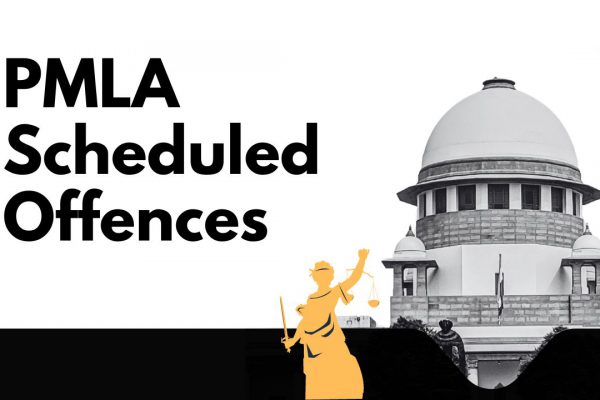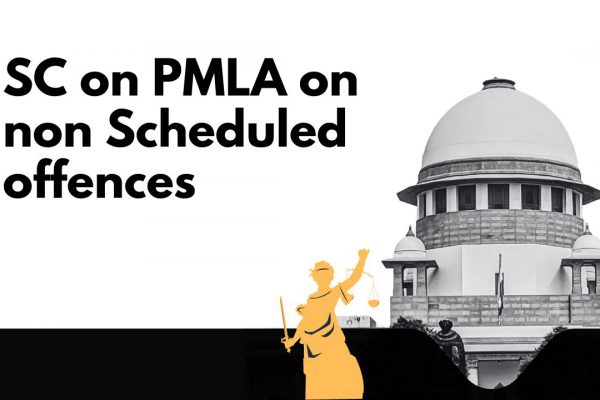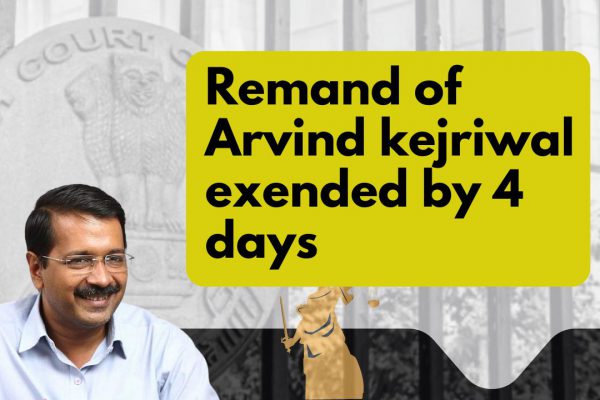The Constitutional Validity of Section 13(8)(B) of IGST Act 2017
Various pre-GST concepts were transitioned into the GST era, but many were embedded with legacy disputes as well. To mention the best illustration, ‘Intermediary ’ could be one of them.
Hon’ble Gujarat High Court in case of Material Recycling Association of India vs Union of India dated 24.07.2020 2020-TIOL1274-HC-AHM-GST
Parliament has exclusive powers under Article 246A of the Constitution to frame laws for the inter-state supply of goods or services.
Only because the invoices are raised on the person outside India and foreign exchange is received in India, it would not qualify to be export of services, more particularly when the legislature has thought it fit to consider the place of supply as the location of the service provider in India.
There is no deeming provision, but a clear stipulation in the Act legislated by the Parliament to consider the location of intermediary as the place of supply.
Related Topic:
A similar situation also existed in the service tax regime.
Therefore, it is a consistent stand of the government to tax services provided by intermediaries in India.
Thus, the HC held that section 13(8)(b) read with section 2(13) of the IGST Act cannot be considered as ultra-vires or unconstitutional.
However, Justice Ujjal Bhuyan of Bombay HC observed that the decision of Gujarat High Court has no binding force and chose to disagree with it.
Dharmendra M. Jani v. Union of India [W.P. No. 2031 of 2018 dated June 09, 2021
- “…by artificially creating a deeming provision in the form of section 13(8)(b) of the IGSTAct, where the location of the recipient of service provided by an intermediary is outside India, the place of supply has been treated as the location of the supplier i.e., in India. This runs contrary to the scheme of the CGST Act as well as the IGST Act besides being beyond the charging sections of both the Acts “.
2. The judge also said that the provision runs counter to the principle of GST being a destination-based tax “The extra-territorial effect given by way of Section 13(8)(b) of the IGST Act has no real connection or nexus with the taxing regime in India introduced by the GST system; rather it runs completely counter to the very fundamental principle on which GST is based i.e., it is a destination-based consumption tax as against the principle of origin based taxation ”
3. “Thus having regard to the discussions made above and upon thorough consideration, we have no hesitation in holding that section 13(8)(b) of the Integrated Goods and Services Tax Act, 2017 is ultra-vires the said Act besides being unconstitutional”.
Related Topic:
Download IGST Act with amendments till date
Dissented view by Justice Abhay Ahuja
Justice Ahuja dismisses Assessee’s challenge to Article 14 & Article 19(1) (g) of the Constitution of India, further finds that challenge w.r.t. charging sections of Acts which operate in different fields in respect of supplies of different natures “ appears to be unnecessary ”.
Noting that place of supply of Intermediary service (of arranging, marketing, facilitating the export of overseas customers to Indian importers) is defined to be the location of supplier u/s 13(8)(b).
“ when there is a specific provision defining Intermediary as in section 2(13) of the IGST Act and Intermediary Services are specifically dealt with in section 13(8)(b), the question of application of the general provision of Section 2(6) of export of services would not arise ”.
Agreeing with the conclusion of Gujarat HC in Material Recycling Association of India expresses that a position of law regarding the legitimacy of Section 13(8) (b) or section 8 (2) “ cannot be doubted”; Remarks “When the Constitution has empowered the Parliament to formulate principles determining the place of supply.
Related Topic:
Principles for Determining Supply of Goods/Services in the Course of Interstate Trade or Commerce
Section 13(8)(b) cannot be said to be ultra vires the charging section as Section 13(8) (b) does not violate the levy on the supply made by the intermediary, particularly in view of Section 7, which designates such supplies to be inter-State supplies ”.
Justice Ahuja also refers to the Statement of Objects and Reasons to Constitution 101st Amendment Act, 2016 as relied on SC in its ruling in Mohit Minerals (Guj HC) which dismissed a challenge to Compensation Act as well as Rules.
When there is a specific provision, Section 13(8)(b) does not and cannot deem an inter-State supply to be an intra-State supply. There would therefore be no question of deeming Petitioner’s supply of intermediary services to be intra-State supply ”.
Dismissing assessee’s contention that attempt to artificially link Section 8(2) with Section 13(8)(b) is misplaced and unfounded, infers “ no fault can be found with the provision by artificially attempting to link it with another provision to demonstrate constitutional or legislative infraction ”.
On the argument of double taxation, Ld. Judge opines that “the principle is well settled that two taxes which are separate and distinct imposts on two different transactions/supplies is permissible as in law there is no overlapping ”.
Related Topic:
101st Constitution Amendment Act, 2016
Key Points
CBIC vide FAQ No. 25 on December 27, 2018, regarding the banking sector has stated that Commission Agent in India should charge CGST and SGST/UTGST when acting as an intermediary of the foreign principal, as the location of supplier and place of supply are in the same state.
The Hon’ble CESTAT has also held that an assessee providing marketing support services to its associate companies is not facilitating or arranging purchase and sale on behalf of Advertising Marketing and Distributor entities outside India, hence not intermediary services. The view has been upheld in ADM India (P.) Ltd Vs CST Bangalore, 22825- 22827/2017, Dated: November 20, 2017.
In Cliantha Research Ltd, GST-ARA119/2018-19/B-50, Dated: May 04, 2019, the AAR held that if the goods are physically made available by the sponsor in India from some other place outside India, then place of supply of service will be considered as India and thus, such will not be considered as export of services.
Further in Toshniwal Brother (SR), KAR/AAAR/06/2018- 19, Dated: January 09, 2019, the AAR has held that promotion of products of any other person qualifies as intermediary services.
Related Topic:
Section 10(1)(a) IGST Act –Place of Supply
Author’s Comments
Two key ingredients which determine the transaction as “inter-state ” vis-à-vis “intra-state ” are (i) location of the supplier and (ii) place of supply.
As per Section 7 of the IGST, where the location of supplier and place of supply are in two different States, it is an interstate supply.
Similarly, as per Section 8 of the IGST Act, a supply is an intra-state supply, where the location of supplier and place of supply is in the same State.
Further, as per Section 7(5)(c) of the IGST Act if a supply made in India is not an intra-state supply it would be an inter-state supply.
Section 13 of the IGST Act is applicable to identify a transaction as inter-state supply under Section 7(5).
Section 7(5)(c) is a residuary clause intended to capture any substantial transaction which should not escape the tax net.
Providing more clarity on the scope of intermediary services could help in avoiding unwarranted litigation. It is relevant to note that the circular on intermediary services issued earlier under GST, was withdrawn ab-initio.
The 139th report of Rajya Sabha proposes for intermediary services to be exports, however, such a proposal was made in December 2017 and it’s still on
papers and GST council have ignored to date and only worried about tax collections without being concerned about other factors if treated as exports there could be investments in India, CFE earnings, increase in income tax collections, etc.
In such an uncertain situation, it is high time for CBIC to clarify the nature of the applicable tax.
Rest, we support the view of Justice Ujjal Bhuyan.
If you already have a premium membership, Sign In.
 TaxTru Business Advisors
TaxTru Business Advisors
Consultants


